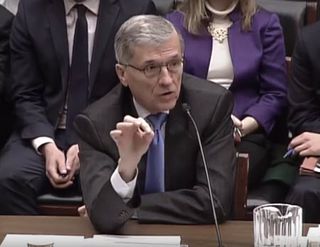Wheeler Catches Some Set-Top Heat

Washington — Federal Communications Commission chairman Tom Wheeler stopped short of saying he would press the pause button on his proposal to “unlock” cable set-top boxes, but he has signaled he would work with members of the committee on their issues with the proposal.
And they did have issues.
The key to that exchange — which took place at an FCC oversight hearing on Capitol Hill — was that it was with a Democratic legislator who was asking for the delay, and that lawmaker wasn’t alone.
Last week, the National Urban League joined the Rev. Al Sharpton’s National Action Network, the Rev. Jesse Jackson’s Rainbow PUSH Coalition and others in calling on the FCC to delay any action on the set-top proposal until it had studied the impact of the proposal on diverse programmers.
Rep. Yvette Clarke (D-N.Y.) said at the hearing that she has asked the Congressional Research Service to conduct such a study, and asked Wheeler if he would be willing to hold off until the study was completed.
Wheeler did not commit to a delay, saying only that he would “look forward to working with [Clarke] and the committee” on any issues raised. He did not say he would delay the proceeding, and he said he did not know how long a delay was contemplated.
As expected, committee Republicans hammered Wheeler over the proposal, saying it threatened copyright protections and privacy and was unnecessary and rooted in old technology and thinking. That pushback has now become bipartisan.
Multichannel Newsletter
The smarter way to stay on top of the multichannel video marketplace. Sign up below.
Also at the hearing, Rep. G.K. Butterfield (D-N.C.) went so far as to suggest that he joined some stakeholders in concerns that the proposal could mean a new form of digital redlining.
Butterfield said he was concerned about the potential for the “myriad unintended consequences” of the proposal, including the ability to enforce copyright protections for content creators and distributors.
Wheeler continued to assert last week that the proposal doesn’t threaten copyright holders. In providing an example, though, he also provided fodder for cable ISPs and other opponents.
In talking about his proposal and how it would not allow those third parties to ride roughshod over copyright protections, Wheeler said there are “today the equivalent of competitive set-top boxes available in the market,” citing Google’s Chromecast device. Wheeler said that Chromecast does not violate copyright, does not “overlay commercials” and is not out to take over cable TV, calling that notion “malarkey.”
The Future of TV Coalition, which includes cable ISPs and others opposing the set-top proposal, was quick to pick up that comment and run with it, saying it showed there are already alternatives in the market and that makes the set-top proposal unnecessary.
“If the classic Washington definition of a ‘gaffe’ is to accidentally tell the truth, Chairman Wheeler’s comments at today’s hearing are a whopper,” the coalition said in a statement. “He admitted, plainly and clearly, that apppowered devices like Chromecast and Roku offer consumers an alternative to traditional set-top boxes and are readily available in the marketplace. Which begs the question — why is the chairman so desperate to solve a problem that he admits does not exist?
“Chairman Wheeler correctly points out that apps-driven innovation is already allowing consumers to watch video on a wide range of devices — without hurting small and independent programmers, invading privacy, or undermining copyright protections. Why, then, is he proposing a sweeping mandate that explicitly rejects this apps approach and strips TV providers of the technical and contractual tools they currently use to ensure these protections remain in place?”
In response, FCC press secretary Kim Hart told Multichannel News: “What the coalition fails to acknowledge is that 99% of pay TV consumers rent a box from their pay TV provider, paying $231 a year on average. The marketplace is not providing consumers with choice.
“While Roku and Chromecast may provide ‘equivalent’ functions to a set-top box, today these devices and consumers that use them remain bound by the whims of the pay TV industry,” Hart added. “Pay TV providers choose which device to make an app for and independent app providers cannot develop an app to display this video programming. For instance, no MVPD provides an app to Chromecast.”
Contributing editor John Eggerton has been an editor and/or writer on media regulation, legislation and policy for over four decades, including covering the FCC, FTC, Congress, the major media trade associations, and the federal courts. In addition to Multichannel News and Broadcasting + Cable, his work has appeared in Radio World, TV Technology, TV Fax, This Week in Consumer Electronics, Variety and the Encyclopedia Britannica.

